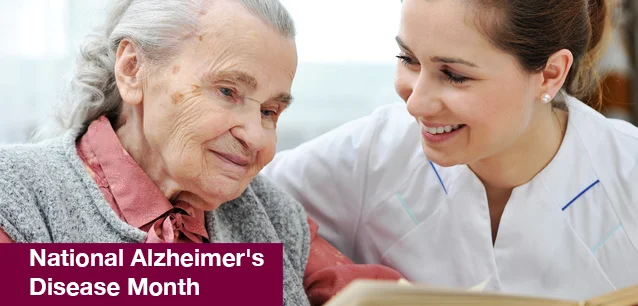The PROFESSIONAL Event, Editorial and Promotional Calendar
Today is: May 20
Scroll to explore events active on this date.
About National Alzheimer's Disease and Brain Month
Lifestyle , Seniors
United States
Ends: Jun 30, 2024
DESCRIPTION:
Worldwide, 47 million people are living with Alzheimer's and other forms of dementia. Join the Alzheimer's Association in going purple and raising awareness this June. The more people know about Alzheimer's, the more action we inspire.
Alzheimer's is a progressive neurological disorder affecting memory, thinking, and behavior and the most common cause of dementia, accounting for 60-80% of all cases. Though the disease primarily affects older adults, early-onset Alzheimer's can also occur in people younger than 65.
The exact cause of Alzheimer's disease remains unknown, but it is believed to involve a combination of genetic, environmental, and lifestyle factors. Researchers have identified specific brain abnormalities associated with Alzheimer's disease, including:
Amyloid plaques—clumps of protein fragments called beta-amyloid that accumulate between nerve cells in the brain, a primary marker of Alzheimer's disease.
Neurofibrillary tangles—twisted strands of a protein called tau that build up inside nerve cells, which are believed to disrupt the normal functioning of nerve cells and contribute to the death of brain cells.
Loss of connections between nerve cells (synapses)—resulting in impaired communication between brain cells, leading to memory loss and other cognitive difficulties.
Inflammation—in the brain may play a role in Alzheimer's disease, although the relationship between inflammation and the condition is not yet fully understood.
Symptoms of Alzheimer's disease usually develop slowly and worsen over time, ultimately interfering with daily activities and self-care. Early symptoms may include:
Memory lapses.
Difficulty recalling recent events or conversations.
Trouble planning or solving problems.
As the disease progresses, symptoms may include confusion, disorientation, mood and behavior changes, and difficulty speaking, swallowing, and walking.
There is currently no cure for Alzheimer's, but treatments can help manage symptoms and improve the quality of life for those affected. These treatments may include medications to help with memory loss, depression, sleep disturbances, and other behavioral symptoms. Non-drug therapies, such as cognitive stimulation, physical activity, and social engagement, can also help manage the disease.
Research into Alzheimer's disease is ongoing, with scientists working to understand the underlying causes better and develop new treatments, including therapies that target amyloid plaques and neurofibrillary tangles. Early detection and intervention may also help slow the progression of the disease, emphasizing the importance of increased awareness and research efforts.
VIDEOS
Currently, this event does not have supporting videos.
SUPPORTING DOCUMENTS
Currently, this event does not have supporting documents.
ADDITIONAL IMAGES
Currently, this event does not have supporting images.


/footer-logo.svg)
